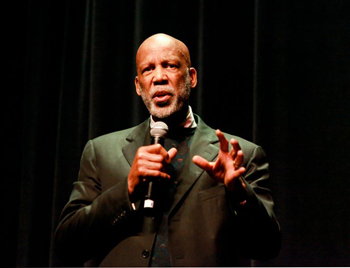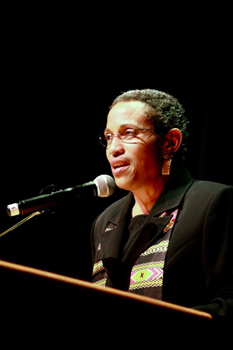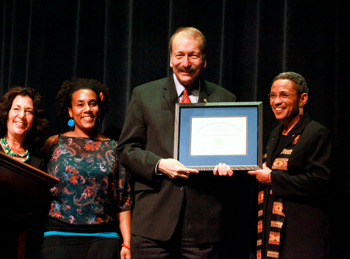Terrence Roberts, civil rights activist and one of "The Little Rock Nine"—the first African American students ever to attend high school classes in Little Rock, Arkansas, under the federal mandate to desegregate public schools—had words of encouragement, vigilance, and caution at UC Santa Cruz's 27th annual Martin Luther King Jr. Memorial Convocation.
"When I was young, people told me, 'Boy, don't cause trouble," Roberts told a packed-to-the-rafters crowd of 1,400 at the Santa Cruz Civic Auditorium. "In my mind, the trouble was already there."
Roberts, author of the 2009 memoir, Lessons From Little Rock, was keynote speaker at an event that celebrates the life and dreams of Martin Luther King Jr. Past speakers have included the authors Alice Walker and bell hooks, former congressman and former NAACP chairman Kweisi Mfume, and Harvard University professor Cornel West.
Roberts, like the other previous speakers, has a spiritual, political, and philosophical connection to King. In fact, he was part of an embattled group of African-American students who sought and received counsel from King himself.
King personally advised the Little Rock Nine about nonviolence, Roberts said. "Dr. King said he was worried about us, that we were young and would give in to provocation and retaliate," Roberts reflected. "He taught us that nonviolence cannot work unless you truly love your enemies. We came back to him and we said, 'Thank you—and we can do this.' All nine of us had spent a lot of time in church."
"When I look back, I sometimes tremble even more at the dangers I faced," Roberts told the rapt crowd. "Sometimes as a teenager, you don't realize the dangers you are in."
Roberts's message—holding fast against oppression and bigotry, without succumbing to either the temptation or the threat of violence—was one of the night's uniting themes. The Reverend Deborah L. Johnson, founding minister and president of Inner Light Ministries, a multi-faith outreach ministry, expanded on this theme as she accepted this year's Tony Hill Award for Community Service, given to recipients who honor the legacy of Hill, a prominent activist who died in 2007.
Johnson, longtime social activist who fought to set a precedent for including sexual orientation in the state's Civil Rights Bill, received the kind of applause that audiences usually hear for rock stars who come to the Santa Cruz Civic. When the clapping and cheering finally died down, she emphasized that there is "no power, and no justice, without love … Does your vision have enough love for those who do not love you back?"
Like Roberts who followed her, Johnson emphasized the importance of patience and diligence in the fight against discrimination. Like him, she mentioned the need for a long view, even in an age of instant gratification.
"It takes tenacity," she said. "Behind every setback is a victory. Dr. King talked about the soul force. You simply wear down the opposition with your love."
She also emphasized that the convocation was a time to move King's legacy forward, and set people forth to continue his good works. "Dr. King didn't want to be worshipped," she said. "This is more than just singing praises. This is about carrying out his [social justice] work."
The evening started out on a rousing note when the Inner Light Ministries Choir, founded in 1993, got the crowd on its feet, singing and dancing along to a new gospel-style song called "You Are Good," a song that was about equal parts human potential and religious faith. "We worship you for who you are," they sang.
UC Santa Cruz Chancellor George Blumenthal spoke of King's emphasis on education and the way it builds intelligence and character.
He mentioned the importance of dreaming and diversity at UCSC, where students have initiated theme dormitories to build community, including the Rosa Parks African American Theme House dorm at Stevenson College and the Indigenous Peoples Hall at Merrill College.
He also spoke about campus's multicultural Rainbow Theater—a mention that received some of the evening's loudest applause.
"If you keep your dream alive, you'll keep Martin Luther King's dream alive, too," Blumenthal said.





